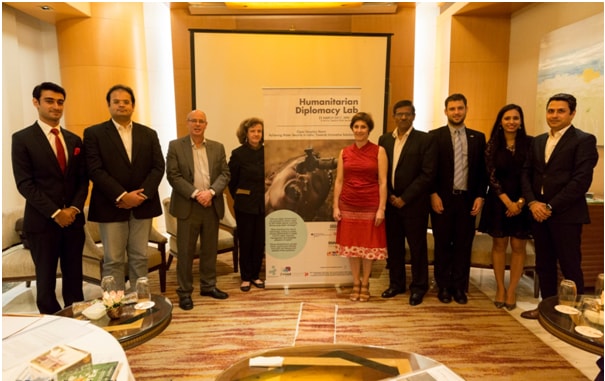An ‘Open Situation Room’ on ‘Water Security in India: Towards Innovative Solutions’, as part of the ‘Humanitarian Diplomacy Lab’ event was held by Vestyn Partners, an accelerator for global businesses in India in association with BMW Foundation and Swiss, German and Israel Consulates.
It was hosted by Jasdeep Randhawa, a water expert, who has consulted for the Organization for Economic Cooperation and Development (OECD), the Government of India, the World Bank, Gates Foundation, and the Water Security Initiative at Harvard along with Rasesh Seth, COO, Vestyn Partners.
Open Situation Room brings together experts and practitioners from many fields, the OSR supplements the classical crisis meeting with an open forum to discuss foreign and humanitarian policy challenges. The OSR in Mumbai combined the specific know-how and skill sets of social entrepreneurs, tech developers and designers, along with that of academics, youth, water experts, social enterprises, NGOs and businesses to ‘hack’ traditional diplomatic problems in start-up style groups. The participants discussed the ongoing water crisis, and identify innovative solutions to address the problem. Particular emphasis was on the application of digital technology, social media and financing such initiatives.
Commenting on the occasion, Jasdeep Randhawa, water expert said, “Water security is among the top global risks in terms of development impact. It is also an integral part to the achievement of the Sustainable Development Goals (SDGs). Meeting the SDGs would require improving management of water resources and ensuring access to reliable water and sanitation services.”
“A World Bank report suggests that water scarcity, exacerbated by climate change, could cost some regions up to 6% of their GDP, spur migration, and spark conflict. The combined effects of growing populations, rising incomes, and expanding cities will see demand for water rising exponentially, while supply becomes more erratic and uncertain,” added Randhawa.
In India, more than 330 million people, around a quarter of the population, are facing acute water shortage. 75.8 million Indians, currently lack access to clean water, with children in 100 million homes lacking access to clean water.
Climate change resulting in drought and water mismanagement due to corruption has further exacerbated the crisis. Evidence shows that agricultural production for essential food grains has declined in the last two decades, as a result of fall in groundwater, lack of investments in agriculture and irrigation.
Over the past twenty years over 300,000 farmer suicides have been reported, with the number being the highest in 2015 with two years of continuous drought. Water conflicts at each level and competing demands among a multitude of users, has resulted in intense violence, litigation, riots, damage to public property, and deaths.
Over 21% of the country’s diseases are water related, as water sources are contaminated with bio and chemical pollutants. With 50% of India’s water contaminated by sewage, Indians purchase water at 72 cents for 50 litres.
Rasesh Seth, Vestyn Partners commented, “Water security is a core issue faced by our country in topical times. It is imperative that solutions available globally must be implemented locally in order to unravel the situation we currently are in. Contemporary technology in the space, backed by proficient implementation, I believe is the call of the hour. ”
Water scarcity in India is expected to worsen as the overall population is expected to increase to 1.6 billion by year 2050. To that end, global water scarcity is expected to become a leading cause of national political conflict in the future, including for India. Therefore, taxed infrastructure, urbanisation, corruption, water mismanagement, failed service delivery, and climate change are just some of the many causes for the exacerbating humanitarian water crisis in India.
Other dignitaries present at the event were Suresh Kulkarni, Secretary, Maharashtra Water Regulatory Authority, David Akov, Consul General of the state of Israel, Gabriele Boner, Deputy Consul General of the Federal Republic of Germany, Nimrod Assouline, Deputy Chief of Mission, Consulate General of Israel, Dirk Walther, Project Director, Support to National Urban Sanitation Policy and Adi Bhujle, Director, German Water Partnership.
Thank you for reading the story until the very end. We appreciate the time you have given us. In addition, your thoughts and inputs will genuinely make a difference to us. Please do drop in a line and help us do better.
Regards,
The CSR Journal Team


